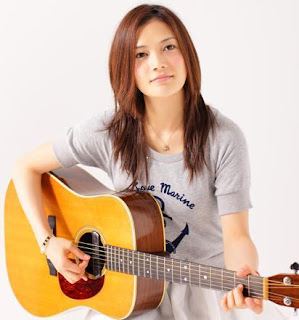Miwa
was born in Hayama,
Kanagawa, however moved to Tokyo at a young age. Since her
father had a great love for a music, miwa naturally began to enjoy music as she
grew up.
miwa began writing
songs at 15. She started self-learning how to play the guitar after she entered
high school, but gave up and paid for professional lessons after finding she
could not make a lot of progress learning by herself. Her high school had a ban on
students having part-time jobs. Despite this, miwa secretly worked, and
eventually used these savings by her second year of high school to buy a Gibson J-45 guitar. After this, miwa played live
concerts mostly around Shimokitazawa in Tokyo and in Okinawa in the summer (her parents had
a house there). Due to her high school also having a ban on students working in
the entertainment business, she had to do these lives in secret (without even
telling her school friends). In this time, miwa released two self-published
independent singles, "Song for You/Today" and "Soba ni Itai
Kara" in 2007 and 2008.
miwa was signed to Sony Music Entertainment Japan during her third year of high
school. She
debuted as an artist in 2010, while attending Keio University. Her debut single, "Don't
Cry Anymore," was chosen to be used for the drama Nakanai to Kimeta Hi's theme song. The single was a minor
commercial success, breaking the top 20 on Oricon's single charts and
being certified by the RIAJ as selling 100,000 full length
cellphone downloads a month after its release. In April 2010, the song won the
award for best drama theme song at the 64th The Television Drama Academy
Awards, beating out songs such as Arashi's "Troublemaker"
and Mr.
Children's "Hanabi.
miwa released her
second single, "Little Girl," in late June. Her third single, "Change,"
was the twelfth opening theme song for the Bleach anime, and was a top 10 single.
For the animated
film adaptation of Eto Mori's novel Colorful, miwa covered two songs by
famous Japanese artists. Yutaka Ozaki's "Boku ga
Boku de Aru Tame ni" was used as the film's image song, and The Blue Hearts' song "Aozora"
was used as the ending theme song of the film. Both songs were released as
digital downloads on August 12, 2010.
miwa considers her
favorite Western musicians to be Sheryl Crow, Deep Purple, Carole King, Avril Lavigne and Taylor Swift. Her favorite Japanese musicians
are Aiko, Angela Aki, Radwimps and Yuki.
miwa previously been
a DJ on monthly radio show on All Night Nippon, miwa no All
Night Nippon R (miwaのオールナイトニッポンR), every third Monday from
3:00am to 5:00am. It has since then been changed
into a weekly show, now known as miwa no All Night Nippon (miwaのオールナイトニッポン), airing every Tuesday (early Wednesday) from
1:00am to 3:00am.
miwa released her
first album Guitarissimo on April 6, 2011 (was scheduled
to release a week earlier on end of March but was delayed due to the Tōhoku earthquake and tsunamiand
its aftereffects). The charts performance was miwa's best overall: the album
reached No. 1 in the Oricon's album charts, making miwa the first Heisei period-born solo singer
to reach a No. 1 on the album charts in the history of the Oricon






Follow Us
Were this world an endless plain, and by sailing eastward we could for ever reach new distances